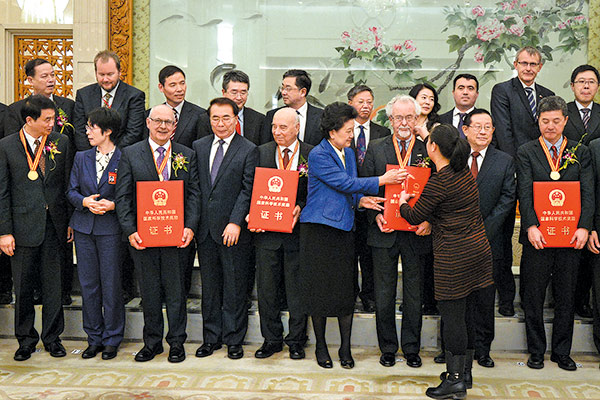
Vice-Premier Liu Yandong (front row, center) joins winners of the State Natural Science Awards for 2017 in Beijing on Jan 8. [Photo/CHINA DAILY]
China has two winners of the annual First Prize of the State Natural Science Award for 2017, a testimony to the nation’s growing research capabilities in fundamental science, experts said on Jan 8.
It is the first time in 12 years that China has two winners within a single year of the nation’s highest honor for major scientific breakthroughs in fundamental research. The last time was in 2006, according to data from the Office of State Science and Technology Awards.
This year’s winners are chemist Tang Benzhong and bioengineer Li Jiayang.
Tang discovered aggregation-induced emission-a chemical phenomenon in which a special type of luminous agent becomes brighter the more it groups together. The discovery revolutionized luminescent biomarkers for material science, medicine, cancer diagnosis, electronics and other fields.
Li discovered the molecular mechanism that decides the quality and yield of rice, which allowed scientists to create an ideal rice crop that is nutritious and tasty and produces a high yield.
“The first-prize winners not only must have groundbreaking scientific achievements, but also must have strong and lasting global impact,” said Chen Zhiming, the deputy director of the office.
The standard for the first prize is so rigorous that typically there is only one winner per year, said Chen. Since 1991, there have been 12 occasions on which there was no first-prize winner, including a three-year drought from 2010 to 2012, according to the office’s data.
“But this year’s first-prize winners lived up to their name,” said Chen. “These achievements are the result of China’s growing effort and devotion to fundamental research.”
After the discovery of aggregation-induced emission in 2001, scientists from more than 1,100 institutes in 60 countries have been studying the strange effect and producing new material, medicine and diagnostic tools, said Tang.
